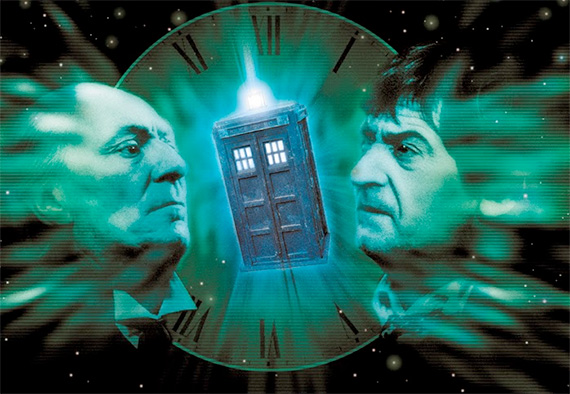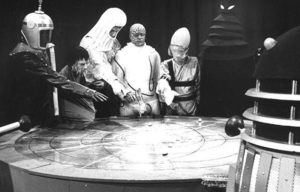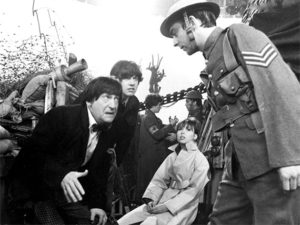Are Longer Stories Better? Five Classics
Guest contributor Tom Fitz looks at some of the longest stories in the show’s history.

Throughout the last couple of years Steven Moffat has exterminated the two-part format that the series had run with since its return in 2005 – the last story to last over one episode was The Rebel Flesh/The Almost People in 2011. The production team stated that “they don’t save us money at all” and would prefer to create ‘blockbuster’ standalone stories instead. It appears that this multi-episode hiatus is about to end with the new series but is this the right decision?
To answer whether these longer stories are a waste of time I am going to turn back time to the first seven years of the show where longer stories were very popular. Six-part stories were very common, especially in the Patrick Troughton era, but every so often they would break the six-part boundary and have stories which were seven, eight, ten and even twelve episodes long. A lot of these are very highly regarded and I believe are the evidence needed to prove that longer stories work and that they should be reinstated on a more frequent basis than what appears to be the case in Series Eight. Below are some examples:
Case One – The Daleks’ Master Plan
 The centrepiece of Doctor Who’s third season was a TWELVE-part space epic – The Daleks’ Master Plan. It was such a massive story that it even had a prequel story Mission to the Unknown.
The centrepiece of Doctor Who’s third season was a TWELVE-part space epic – The Daleks’ Master Plan. It was such a massive story that it even had a prequel story Mission to the Unknown.
Despite lasting over four hours, I am gripped to this epic story from beginning to end. William Hartnell is on top form as usual, Peter Purves is brilliant as Steven and Jean Marsh is electric as Sara Kingdom. Furthermore the guest cast is sensational. Kevin Stoney gives one of his legendary villain performances as Mavic Chen and Nicholas Courtney is great as Bret Vyon. Unfortunately nine episodes are missing at the moment but in the three episodes that exist we can see how extraordinary Douglas Camfield’s direction is and makes you sad that we cannot see the rest. The Daleks are menacing, threatening and powerful in this story. Finally, the story touches on darker themes with the death of two companions: Katarina and Sara Kingdom.
Twelve highly recommendable episodes that help to prove that if done well, longer stories can be great.
Case Two – The Invasion
 I must confess that this is my all-time favourite story! Eight episodes but my attention is gripped from beginning to end. Douglas Camfield is directing again and does an extraordinary job again. Derrick Sherwin (writer) utilises the long story format to the stories advantage here. By having eight episodes both Jamie and Zoe are given a lot of attention to.
I must confess that this is my all-time favourite story! Eight episodes but my attention is gripped from beginning to end. Douglas Camfield is directing again and does an extraordinary job again. Derrick Sherwin (writer) utilises the long story format to the stories advantage here. By having eight episodes both Jamie and Zoe are given a lot of attention to.
What could be described as ‘padding’ in the first four episodes is actually the writer cementing the relationship between the Doctor and Jamie. Both companions are given time to shine and some of their most memorable scenes are in this and scenes such as Zoe blowing up the computer using a complex computer language would not have been included if the story was not this long.
UNIT are introduced properly here and personally this is the best version of the organisation. It is a serious military organisation as seen throughout season seven but the characters inside the organisation are really given time, thus creating the perfect mix between the serious UNIT of season seven and the UNIT family vibe of season eight.
Case Three – The War Games
 Coming in number twelve in the recent Doctor Who Magazine poll, this story is very highly regarded in fandom (along with all the others for that matter). Ten gripping episodes, great performances, great script – what is not to like. There are a number of great villains in this story as well from General Smythe, the Security Chief, The War Chief and then The War Lord. This all culminates in one of the most important episodes in Doctor Who’s history – the revelation of the Time Lords and the first ever proper hints into the past of the Doctor.
Coming in number twelve in the recent Doctor Who Magazine poll, this story is very highly regarded in fandom (along with all the others for that matter). Ten gripping episodes, great performances, great script – what is not to like. There are a number of great villains in this story as well from General Smythe, the Security Chief, The War Chief and then The War Lord. This all culminates in one of the most important episodes in Doctor Who’s history – the revelation of the Time Lords and the first ever proper hints into the past of the Doctor.
Case Four – Doctor Who And The Silurians
 Malcolm Hulke provides a totally original story, defying Terrance Dick’s beliefs that there were only certain types of story you could tell set on Earth, at the same time he provides one of the most intelligent, multi-layered story in Doctor Who’s history.
Malcolm Hulke provides a totally original story, defying Terrance Dick’s beliefs that there were only certain types of story you could tell set on Earth, at the same time he provides one of the most intelligent, multi-layered story in Doctor Who’s history.
This seven-parter does something which many do not do – it makes the audience think. By allowing the audience a vicarious relationship with the story, Hulke adds another dimension to a story – offering a dilemma where there are not clear right answers.
The characters in this story are given time to breathe and therefore become fully rounded real characters. Despite being seven episodes long this story does not lag, instead is very engaging, revelling in the Earth bound format of the time.
Case Five – Inferno
 The final story to break the six-part boundary in the 1970s is Inferno. I do not want to go into this one in too much depth since it has been recently reviewed on the site but to summarise – phenomenal performances, clever script, well-paced, gripping classic! This is one of the best examples of Doctor Who at its time and marks the end of the serious UNIT of Season Seven. From this point on, they began to become less serious as the warmth of the UNIT family became more prominent but a great final hurrah for the original UNIT and Liz Shaw.
The final story to break the six-part boundary in the 1970s is Inferno. I do not want to go into this one in too much depth since it has been recently reviewed on the site but to summarise – phenomenal performances, clever script, well-paced, gripping classic! This is one of the best examples of Doctor Who at its time and marks the end of the serious UNIT of Season Seven. From this point on, they began to become less serious as the warmth of the UNIT family became more prominent but a great final hurrah for the original UNIT and Liz Shaw.
There are many other great stories which could also be added including The Evil of the Daleks and The Ambassadors of Death. These stories are really popular.
Looking at the classic stories mentioned in this article one has to wonder why the modern day production team does not believe that the longer story format should be invested in further. If stories such as The Invasion, The War Games and The Daleks Master Plan can keep me and thousands of Doctor Who fans gripped from beginning to end despite being eight plus episodes long, why was the current production team to scared to have two part stories in series seven? Stories such as The Power of Three and Nightmare in Silver were crying out for a second part last season and I do hope this does not happen again. I am glad the Series 8 finale is going to be two episodes long but to me this is not enough.








